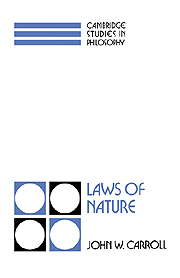Appendix A - Nomic platonism
Published online by Cambridge University Press: 12 January 2010
Summary
Seeing themselves as opposing the Humean tradition, and convinced by arguments like those given in Chapter 2 (and, to some extent, by demonstrations something like those given in Chapter 3), certain philosophers have felt that an appeal to universals or possible worlds would be of tremendous benefit to their investigation of laws of nature. As these nomic platonists see it, if we are willing to recognize necessary connections in nature, or other ways our world could be, then realism about laws can be upheld. David Armstrong (1983, 1988, 1993, 199?), Michael Tooley (1977, 1987), FredDretske (1977), and Robert Pargetter (1984) are four of the most prominent nomic platonists. As is indicated by the many references scattered throughout my book, I have great sympathy for many of their contentions. Indeed, I agree that one should endorse realism about the nomic, and I concur that Humeanism is not viable. Where I disagree is on two crucial points. First and foremost, I reject the reductionist tendencies that many of them frequently exhibit. Second, even setting the issue of reductionism aside, some of the specific positions that they adopt are untenable. In particular, Armstrong gives an analysis that, though it can be construed in a nonreductive fashion, is still subject to counterexample. In Section A.1, via a critical discussion of the work of Armstrong, Dretske, and Tooley, I evaluate the chances of giving a reduction of lawhood via an appeal to universals.
- Type
- Chapter
- Information
- Laws of Nature , pp. 161 - 181Publisher: Cambridge University PressPrint publication year: 1994



